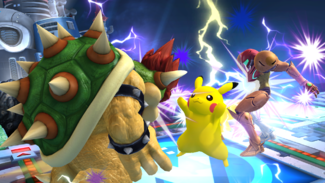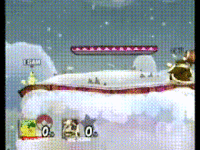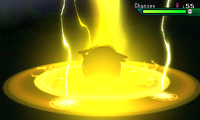Thunder (Pokémon): Difference between revisions
No edit summary |
m (AWB, typos fixed: well-known → well known) |
||
| Line 36: | Line 36: | ||
[[File:ThunderGI.png|thumb|Thunder in Generation I ''Pokémon'' games.]] | [[File:ThunderGI.png|thumb|Thunder in Generation I ''Pokémon'' games.]] | ||
[[File:Thunder.png|thumb|Thunder in Generation V ''Pokémon'' games.]] | [[File:Thunder.png|thumb|Thunder in Generation V ''Pokémon'' games.]] | ||
Thunder is based off a move of the same name in the [[Pokémon (universe)|Pokémon RPGs]]. Thunder is well | Thunder is based off a move of the same name in the [[Pokémon (universe)|Pokémon RPGs]]. Thunder is well known as a very powerful and mainstream special Electric-type attack with base power of 120 in Generations I-V and a base power of 110 in Generation VI as well as being the strongest Electric-type attack in the first generation of the Pokémon games (and one of the strongest in the generations afterwards), and for its paralysis rate of 30%. It is also known for its relatively low accuracy of 70% (outside of weather effects: rain makes Thunder never miss, while sunlight decreases its accuracy to 50%), which hinders its efficiency. However, it can even hit Pokémon that are preparing to use [[Fly]], while most other attacks fail against them. In the Smash Bros. games, it is hard for Thunder to hit enemies at the sides of the user, or with the spark the Pokémon produces, but unlike other moves, it can perfectly hit enemies that are at a great distance above the user (having an almost infinite vertical range in ''Smash 64''). | ||
In every generation, Pikachu is able to learn Thunder by leveling up, being of the latest moves it learns. The technical machine TM25 has always been Thunder and Pichu will need that TM in order to learn it. | In every generation, Pikachu is able to learn Thunder by leveling up, being of the latest moves it learns. The technical machine TM25 has always been Thunder and Pichu will need that TM in order to learn it. | ||
Revision as of 13:19, October 6, 2014
| Thunder | |
|---|---|
 Thunder in SSB4. | |
| Users | Pikachu Pichu |
| Universe | Pokémon |
| Article on Bulbapedia | Thunder (move) |
Thunder (かみなり Kaminari) is Pikachu and Pichu's down special move. When used, the Pokémon yells as a bolt of lightning drops from the sky, striking the user if its horizontal momentum has not carried it out of the way (and if there is no platform in the way). Upon hitting the user, a large shockwave is created with stronger knockback than the lightning itself. It will also grant momentary invincibility if it hits the user. This is best seen when using it on a Blast Box, where the Blast Box is destroyed, but the user isn't harmed. The lightning blast stalls the user in place for a while, so they can act more quickly if they are not stuck.
In Super Smash Bros.
In Super Smash Bros., this move has seemingly infinite vertical range and thus can be often used to score KO's when an opponent is near the upper blast line. This technique is called "Thunderspiking", and can lead to much lower-damage KO's. As a result, Pikachu players try to integrate it into their combos as often as they can, typically after an up smash. Even though the move is powerful, it has considerable ending lag. Regardless, it is considered one of Pikachu's best moves. Does 12% damage, 16% for Pikachu's body spark.
In Super Smash Bros. Melee
In Super Smash Bros. Melee, the move strikes from a cloud at a fixed height relative to the user (this is often not visible unless the stage is rather high). For example, if Pikachu or Pichu is under the upper-middle platform at Hyrule Temple and uses Thunder, one can see the cloud from where the thunder is generated, but the lightning will not go through the platform, making the attack useless in that particular location. The thunder portion of the attack is considered a projectile and can be reflected back at Pikachu or absorbed for health. The explosion cannot, however. Pikachu's Thunder's bolt strike has greater horizontal knockback than Pichu's, and is otherwise the same as it was in Super Smash Bros., minus the infinite height. Pichu's bolt strikes multiple times and has slightly more upward knockback than Pikachu's, however. Pichu also incurs 3% damage if the bolt strikes it, making it the only electrically charged attack Pichu has that might not damage itself. Pikachu's bolt does 10% while the spark deals 17%. For Pichu, the bolt deals 3, 3, 3, and 5% damage, 16% damage if all hits connect. The spark causes 14% damage.
In Super Smash Bros. Brawl
Thunder in Super Smash Bros. Brawl functions exactly like it did in Melee, except with more KO potential. It can also go through platforms in the upper portion of the move.

An interesting property of this is that if this attack connects with Pikachu in mid-air, Pikachu will bounce upwards a bit. Due to its startup time, it won't aid much in recovery, but is useful to guard break, especially against spikers. If used near the edge of a stage, the Thunder can create a wall of electricity to prevent a recovering opponent (especially if Thunder Jolts are sent out beforehand), best if they try to go for the ledge.
Reverse Thunder
In Brawl, Thunder can be reversed by pushing the control stick/d-pad in the opposite direction in the first few frames. Though useless on the ground, when performed in midair with momentum, the momentum will be reversed, pushing Pikachu in the opposite direction.
In Super Smash Bros. 4
The move returns in Super Smash Bros. 4, where the lightning bolt is now capable of meteor smashing characters. This is intended to lead into a follow-up attack combo, although the setup is not flawless, as opponents can still escape in between attacks.
Thunder also gets two variations: "Self-Generation," where electricity discharges from Pikachu to launch opponents, and "Great Thunder," which starts higher than normal, with a sweetspot where it begins and a sourspot where it ends.
Origin
Thunder is based off a move of the same name in the Pokémon RPGs. Thunder is well known as a very powerful and mainstream special Electric-type attack with base power of 120 in Generations I-V and a base power of 110 in Generation VI as well as being the strongest Electric-type attack in the first generation of the Pokémon games (and one of the strongest in the generations afterwards), and for its paralysis rate of 30%. It is also known for its relatively low accuracy of 70% (outside of weather effects: rain makes Thunder never miss, while sunlight decreases its accuracy to 50%), which hinders its efficiency. However, it can even hit Pokémon that are preparing to use Fly, while most other attacks fail against them. In the Smash Bros. games, it is hard for Thunder to hit enemies at the sides of the user, or with the spark the Pokémon produces, but unlike other moves, it can perfectly hit enemies that are at a great distance above the user (having an almost infinite vertical range in Smash 64).
In every generation, Pikachu is able to learn Thunder by leveling up, being of the latest moves it learns. The technical machine TM25 has always been Thunder and Pichu will need that TM in order to learn it.
Use by other Pokémon
- Raikou - Raikou uses Thunder in Melee by surrounding itself in an electrical current, covering a large area. Touching the bolts of Thunder will hit the opponents engulfed with fixed knockback, with each hit dealing 20% damage.
- Rayquaza - In Brawl, when Rayquaza is brought down to low HP levels during the Boss fight against it, Rayquaza may use Thunder. Rayquaza will fly up, circle a few times, then let a thunderbolt loose beneath it. This attack can break shields easily due to its quick consecutive hits, and can bring characters upward, but does not have any real knockback, despite causing high damage.
Description from the Melee Instruction Booklet
Call thunderbolts down from the sky. They won't pass through terrain obstacles.
Description from the Brawl Instruction Booklet
Call forth a huge bolt of lightning that shoots straight down. It does not travel through platforms.
Description from the Super Smash Bros. for Nintendo 3DS Foldout
Call down lightning to strike opponents.
See also
- Pikachu's down special in Smash 64
- Pikachu's down special in Melee
- Pikachu's down special in Brawl
- Pichu's down special






